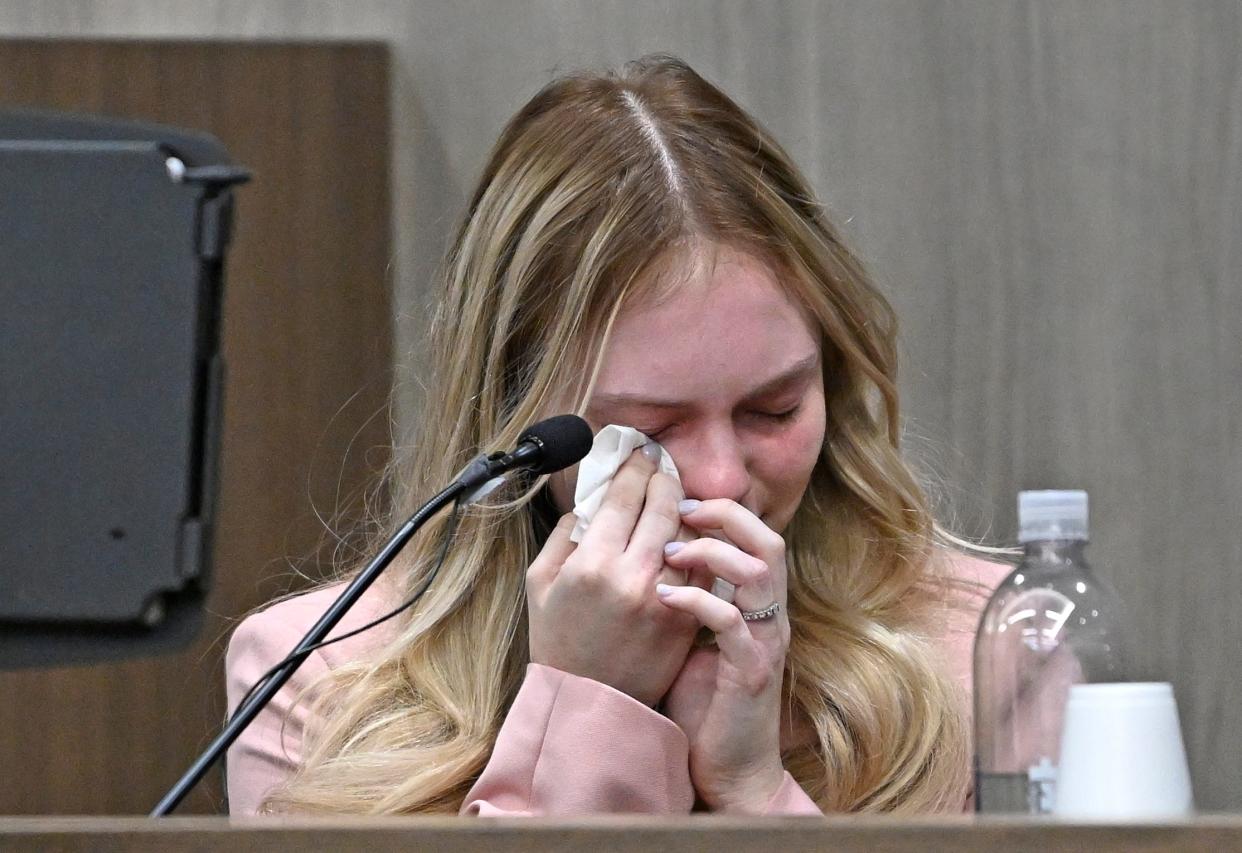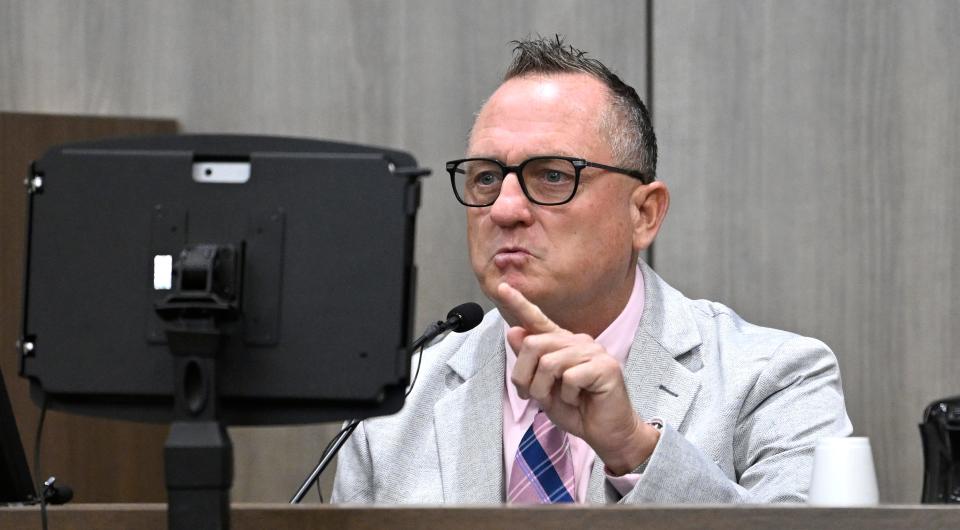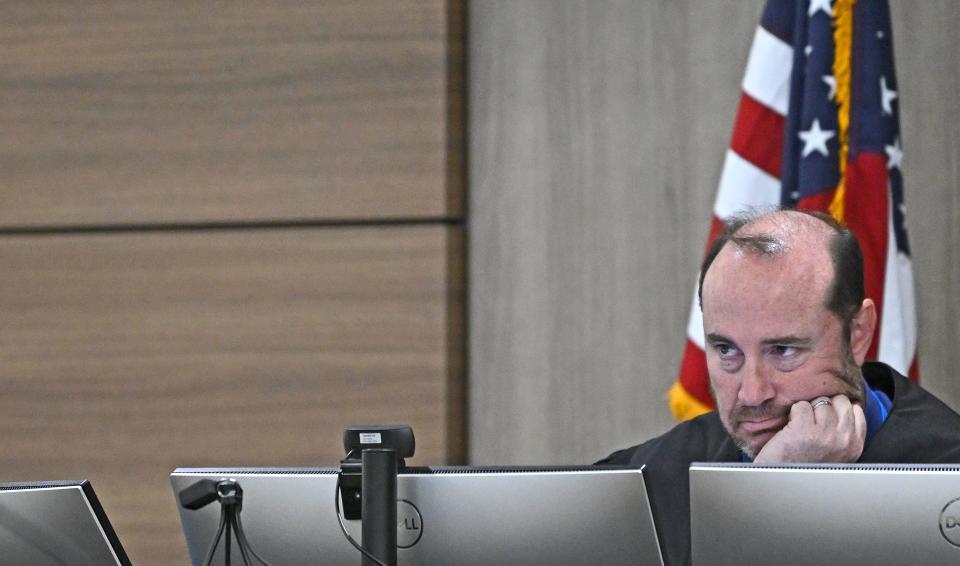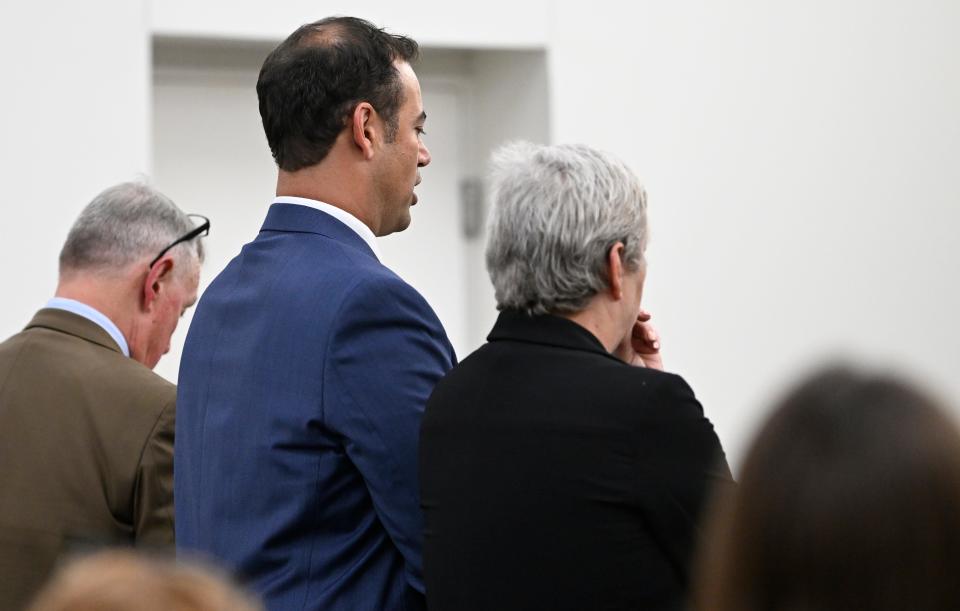'Take Care of Maya' trial: Maya Kowalski testifies about hospital experience

The last time Maya Kowalski saw her mother, Beata Kowalski was about to head to work while Maya was in her bed in the pediatric ICU at Johns Hopkins All Children’s Hospital in October 2016.
Before she left, she told her daughter: “I love you, and I’ll see you tomorrow.”
Beata Kowalski wouldn’t be allowed back in the hospital because of a court order placing her daughter in protective custody, she wouldn’t be granted supervised visits like her husband and would be barred from giving her daughter a hug more than three months later at a dependency hearing.
“I never saw her again,” Maya Kowalski said, tears streaking down her face.
Previous reporting: Doctor's suspicion tears apart Venice family
'Take Care of Maya' trial: Father takes stand, Sarasota judge denies 2 mistrial motions
On Jan. 7, 2017, Beata Kowalski took her life following an investigation into child medical abuse allegations against her.
In court on Monday, Maya Kowalski remembered not being able to sleep in her room at All Children’s Hospital due to her pain and depression that same night, and at around 2 a.m., she broke down crying.
“I miss my mom, I miss my mom, I love my mom, I want to go home to my mom,” Maya Kowalski recalled crying to a nurse. The next day, her father, brother, and a priest broke the news to her.
The three weren’t allowed to console her for long, Maya Kowalski said, adding it was “absolutely cruel” the amount of time they allocated to let them stay after telling her about her mother.
Maya took the stand wearing a light pink suit jacket, often leaning into the microphone as she answered because of her soft-spokenness.
Several members of the gallery were also wearing pink to show their support during the emotional testimony. The gallery had at least 40 people, the most out of all the days of the trial so far, with Sarasota Circuit Court Judge Hunter Carroll announcing that an overflow courtroom would be opened.
The Kowalski family sued All Children’s Hospital in 2018 for false imprisonment, negligent infliction of emotional distress, medical negligence, battery, and other claims more than a year after the family matriarch, Beata Kowalski, took her life following allegations she was abusing her daughter.
The family took 10-year-old Maya Kowalski to All Children’s Hospital in October 2016 after she complained of severe stomach pain, believed by the family to be a relapse of her Complex Regional Pain Syndrome, a disorder that impairs the central nervous system and heightens pain sensations. The illness is sometimes also referred to as Reflex Sympathetic Dystrophy Syndrome.
Maya Kowalski was separated from her family, friends, and community following a Florida Department of Children and Families investigation and ordered by a judge to remain at the hospital. She remained separated for three months before reuniting with her father and brother shortly after her mother’s death.
Maya Kowalski's father recalled social worker's deposition

Jack Kowalski, Maya’s father, was recalled to the stand Monday morning to answer a few more questions regarding social worker Catherine Bedy’s deposition that was played in court on Thursday.
Jack Kowalski testified he at no point gave Bedy permission to touch, hug, kiss, place on her lap, or photograph his daughter. He also recalled his daughter asking him at one point if her mother, Beata Kowalski, was in a mental health hospital because she had been told by Bedy that her mom was getting treatment.
“I was outraged,” Jack Kowalski said.
Ethen Shapiro, defense counsel for the hospital, questioned if Jack Kowalski had ever witnessed Bedy doing or saying anything inappropriate to his daughter. Jack Kowalski said he had never witnessed any inappropriate behavior.
The jury, as well as those in the gallery, also saw a birthday card Beata Kowalski had written for her daughter’s 11th birthday. Jack Kowalski remembered that his wife had painted her lips with lipstick before kissing the card, leaving behind impressions for her daughter. Jack Kowalski gave it to Bedy to give to his daughter, only to learn Maya never received the card.
Greg Anderson, attorney for the Kowalskis, asked if Jack Kowalski was also aware that there were talks to separate Maya Kowalski from her family through adoption or through fostering. In a letter written on Nov. 2, 2016, a section states that Bedy suggested medical foster care could benefit Maya Kowalski.
Shapiro pointed out in his questioning that the medical fostering was a DCF consideration, not the hospitals.
'Acted as a catalyst that just set my body on fire'
Maya Kowalski took the stand after her father, spending almost the entire day testifying to the jury. During parts of her testimony, members of the gallery and some jurors wiped away tears as Maya broke down recalling some of her memories.
More trial coverage: 'Take Care of Maya' trial: Jury hears Maya's former attorney, doctor and social worker
Keep reading: 'Take Care of Maya' trial: Pain medicine specialist testifies about Maya's crippling pain
The jury learned through Maya’s testimony that she has always had a high pain tolerance — including the fact that she once fractured her arm while on her bike, got up from a ditch without crying, rode back home and her parents didn’t take her to the hospital until three days later when they noticed she still held her arm weirdly.
What set off the CRPS is still not fully known, Maya Kowalski said. Prior to July 3, 2015, the date that seemingly was the catalyst to the chain of events that followed, Maya had sprained her ankle and during the celebration, she had a severe asthma attack which led her mom to take her to Sarasota Memorial Hospital.
Maya Kowalski detailed how the pain from CRPS started off slowly first in her right leg and gradually spread to other parts of her body.
“How I describe it to people who don’t have CRPS is like, I was born with gasoline deep within my body, and some incident, whether it was that sprained ankle or the severe asthma attack, was like a match and acted as a catalyst that just set my body on fire, and I have to live with this burning pain,” Maya Kowalski said.
Maya Kowalski added she and her parents tried everything doctors and specialists suggested. She tried intensive physical and occupational therapy, she did warm water therapy, and she was prescribed opioids. Nothing seemed to work.
When Dr. Anthony Kirkpatrick, a pain medicine specialist in Tampa, diagnosed Maya Kowalski with CRPS, it was a relief to at least know what Maya was up against.
“I mean, no parent wants their kid to have, like, a chronic illness, so they were sad, but I think at the same time, they were just happy to hear a definite answer,” Maya Kowalski said.
Maya Kowalski also dispelled the misconception that all CRPS symptoms are constant, saying that they change from day to day.
When asked about the controversial ketamine coma treatment, Maya explained that Dr. Kirkpatrick and Dr. Fernando Cantú Flores not only spoke with her parents but also went over the risks of the procedure and potential side effects. Maya Kowalski told the jury they could imagine how bad the pain from CRPS must have been if a 10-year-old was willing to take the risks.
Maya Kowalski spent the afternoon detailing her time at the hospital between Oct. 7, 2016, and her release on Jan. 13, 2017.
Maya Kowalski shared many of her negative experiences with the jury, while also setting the record straight on certain notions, including the fact that when she was first transferred to the PICU, the nurses wanted to insert a tube down her nose without giving her sedation, and it would have caused her too much pain. Maya said she screamed and thrashed.
When Maya Kowalski tried to tell doctors and nurses about her symptoms, she said she was ignored and that certain hospital staff tried convincing her she was faking it. Anderson showed the jury several dated photographs depicting lesions, or sores, that had formed on Maya during her stay at the hospital, as well as progress reports from the same days in which hospital staff did not mention the lesions at all as an example of staff ignoring Maya Kowalski’s efforts to point out symptoms.
At one point, Maya Kowalski said Catherine Bedy had told her that Beata Kowalski was suffering from a mental health issue and was in an institution, which Jack Kowalski denied when Maya was able to speak with him. Bedy also mentioned that she could be Maya’s mother and said that foster care isn’t like it’s depicted in the movies, Maya Kowalski said.
Maya Kowalski also expanded how isolated she was in the hospital, stating there was a time she met a younger girl who was at the hospital with her mom and the two noticed Maya was always by herself without a parent. A nurse observed the young patient speaking with Maya and went to tell Bedy, Maya Kowalski said. Bedy later confronted Maya and said she wasn’t to speak to another patient again, Maya added.
Another factor in her isolation was the supervised calls with her mother, Maya Kowalski said. Bedy would often sit on the edge of the bed, making faces or rolling her eyes, and would cut in to limit what Beata Kowalski was saying to her daughter.
In recorded audio played in court of a phone call between Beata and Maya Kowalski, Bedy could be heard cutting Beata Kowalski off three times when she started talking about the case or Maya’s physical therapy, or when Maya said her condition was worsening.
Maya Kowalski also testified about the Jan. 6, 2017, court hearing and the photographs taken before she was able to go. The photos had been taken against her will, with Bedy threatening that Maya wouldn’t be able to go to court unless she stripped down and had photos of herself taken. Maya explained that DCF usually took before and after photos to compare her progress, but on this occasion, it was different.

After compromising that Maya would be able to keep on her training bra and some shorts, she was held down by a nurse as Bedy took photos. Maya Kowalski learned much later that the photos had never been entered into her medical records, and she said that no “after” photos were taken.
“I felt betrayed in that hospital almost every day,” Maya Kowalski said.
In case you missed it: 'Take Care of Maya' trial: Sexual abuse allegations arise, could be added to complaints
Day 2 of 'Take Care of Maya' trial: Younger brother, uncle testify
During his questioning, Anderson pointed out that Maya Kowalski was wearing a silver pendant necklace in court during her testimony.
Maya explained that she celebrated her 11th birthday in the hospital, and through a program that raised funds for children, she was given $20 to spend on presents. Instead of getting anything for herself, Maya bought a Nerf gun for her brother, a pendant necklace with the words “I love you to the moon and back” for her mother and her dad’s favorite mints.
The words on the necklace held significant meaning, it was something her mother always told her, Maya said, wiping away tears.
“I found out later that she wore it every single day, and when she was found in the garage, she was still wearing it,” Maya Kowalski said.
Defense for hospital questions Maya

During Shapiro’s cross-examination of Maya, he focused on her improvement following her release from the hospital.
He pointed out that about eight months after she left the hospital, she was walking with crutches and by the time she was in middle school, she was walking unassisted. In comparison, more than a year prior to her admission to All Children’s Hospital, Maya Kowalski remained wheelchair-bound despite the various ketamine treatments.
Shapiro also highlighted that in a care booklet that was given to Maya Kowalski at the hospital, in a section for her to list the names of staff members she liked, she put down plenty of names of staff members, as well as listing other parts of her stay she liked.
Maya Kowalski pushed back at the questioning, saying she wrote those names and things down in the hopes that if the staff liked what she wrote, she would be able to go home.
Shapiro pointed out that once Maya was back in school, she participated in physical education, and some sports, even breaking her pinkie when she caught a football wrong and had to have a pin placed. Yet, that didn’t aggravate Maya’s CRPS, Shapiro said.
Maya Kowalski explained that there are some things that aggravate the condition more and others not so much, she added she still has bad days where she remains in bed all day and better days where she can function.
Gabriela Szymanowska covers the legal system for the Herald-Tribune in partnership with Report for America. You can support her work with a tax-deductible donation to Report for America. Contact Gabriela Szymanowska at gszymanowska@gannett.com, or on Twitter.
This article originally appeared on Sarasota Herald-Tribune: 'Take Care of Maya' trial: Maya Kowalski testifies before the jury

